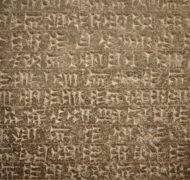An Overview of the Book of Isaiah
Bible Commentary / Produced by TOW Project
According to Isaiah 1:1, the prophet Isaiah’s career extended through the reigns of four kings in the southern kingdom of Judah: Uzziah, Jotham, Ahaz and Hezekiah. He served as God’s emissary to Judah for more than fifty years (from around 740 to 686 B.C.), roughly a hundred years before the other three major writing prophets — Jeremiah, Ezekiel and Daniel. While the political scene in Judah was different from that in the northern kingdom of Israel, the sins of the people were distressingly similar: idol worship, the oppression and marginalization of the poor for personal gain, and business practices that fundamentally threatened God’s Law. Like his contemporary Amos (who delivered God’s messages at the shrine in Bethel to the unrepentant people of Israel), Isaiah clearly saw that lip-service worship leads to self-serving social ethics.
Isaiah differs from Jeremiah and Ezekiel in that the character of his prophetic ministry blends foretelling (the seer seeing far into the future) in a greater measure with forthtelling[1] (preaching the truth to a sinful people). While the book of Isaiah provides several historical touch points that anchor the prophet in a particular period of Judah’s history, the book ranges in its visions from Isaiah’s own times through to the end of time when God creates “new heavens and a new earth” (Is. 65:17). Some scholars have described the book of Isaiah as a vision of a mountain range in which the various peaks are visible, but the valleys stretching between the peaks (the time periods separating various prophetic insights) cannot be seen. For example, the prophecy to King Ahaz that God would give him the sign of a baby named Immanuel (Is. 7:14) is picked up seven hundred years later by Matthew (Matthew 1:23) as a vision of the coming Messiah about to be born[2].
The historical notes in the book anchoring the prophet Isaiah in the eighth century before Christ, begin with his receiving a vision of God and a call to prophetic ministry “in the year that King Uzziah died,” namely 740 B.C. (Is 6:1). The text then passes over the fifteen-year reign of King Jotham (2 Kings 15:32-38) and picks up in Isaiah 7:1 with King Ahaz (2 Kings 16:1ff) who was faced with the apparent imminent destruction of Jerusalem at the hand of the Syrians and their allies at the time, the northern kingdom of Israel. Later, in chapters 36-37, the prophet details King Hezekiah’s dilemma when the Assyrian general Sennacherib laid siege to Jerusalem, threatening its total destruction (2 Kings 18:13-19:37).
Isaiah continues Hezekiah’s story in chapters 38-39, a story of the king’s deathly illness and God’s willingness to extend his life an additional fifteen years. In each of these historical touch points, the prophet Isaiah is directly involved with the kings in speaking God’s words to them.
Isaiah’s prophecy casts a vision for the people of God that ranges from impending national judgment, to gracious restoration after the ensuing catastrophe, to the eschatological hope of something so different that it can be referred to only as a new heaven and a new earth (Is. 65:17). His work (predictive as well as exhortative) covers a range from the monarchy in Judah to the nation’s exile in Babylon, to the restoration and return to Judah. He announces events from the coming of the Messiah to the coming of “new heavens and a new earth.” Structurally, chapters 1-39 cover the period of Isaiah’s active ministry, while the remaining chapters of the book (40-66) look deeply into the future for God’s people. Thus the prophetic word of the Lord through Isaiah spans uncounted generations.
Isaiah’s calling was to serve as God’s emissary before the people of Judah and proclaim their sinful status in God’s eyes. Later, the prophet insisted that his prophecies be recorded for future generations: “Go now, write it on a tablet…that it may be an everlasting witness. For these are rebellious people, deceitful children, children unwilling to listen to the Lord’s instruction” (Is. 30:8, 9). The people’s sinfulness is defined by their disregard of God’s law or God’s covenant claims on them as his people. The prophecies against the sinful people are so strong that one could describe the situation as follows: God’s desire for those whom he has called as his people is such that if they will not be his people, then they will be no people at all.





